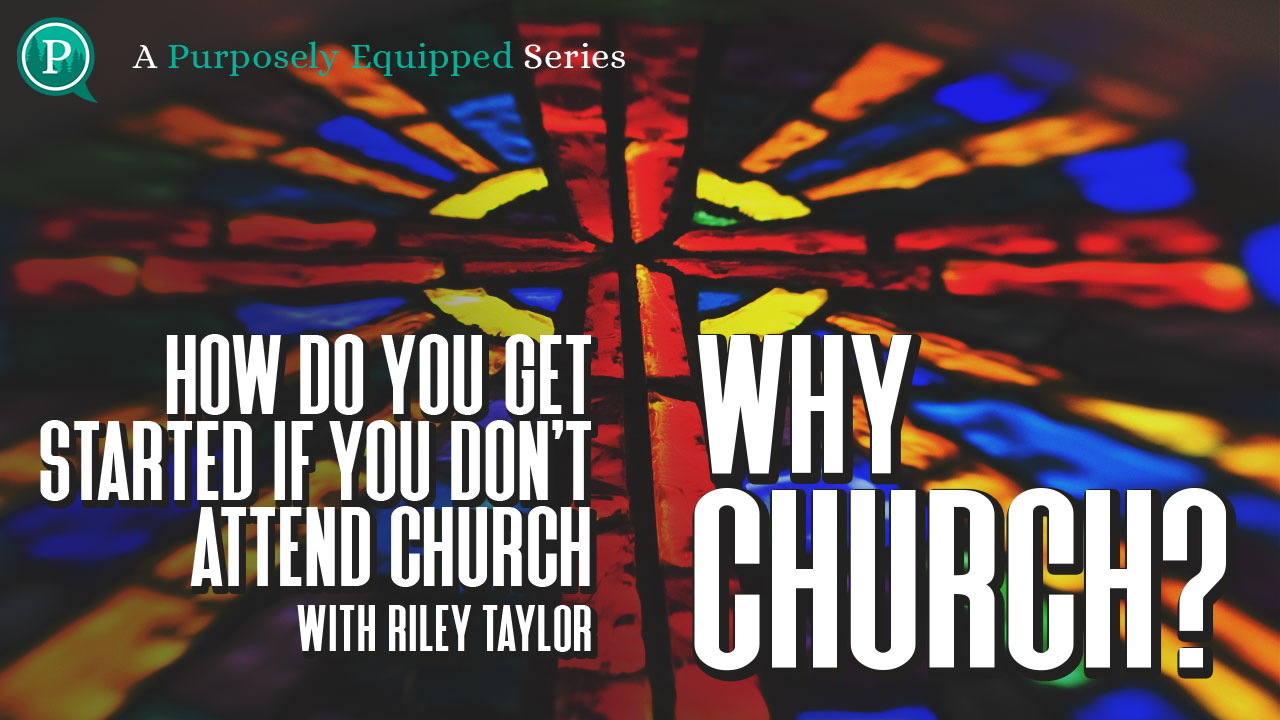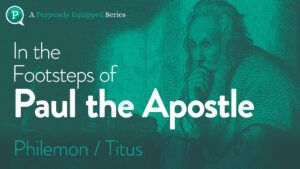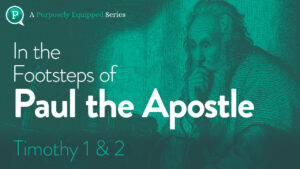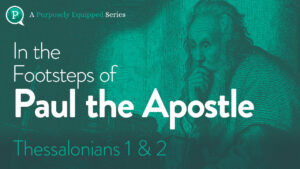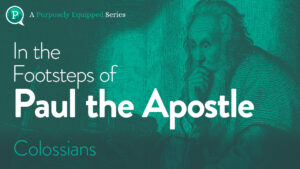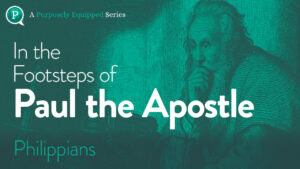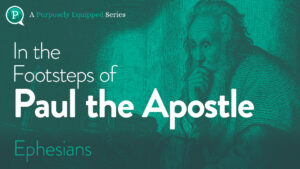Pastor Riley Taylor of Calvary Fellowship joins us in our final episode of Why Church where we tackle how to get started if you currently don’t attend church. This is where the rubber meets the road. Let’s dig in!
Show Notes:
Find Riley at Calvary Fellowship: Online | Instagram | Facebook
- We’d love for you to leave a review. We know most of our listeners come from Apple podcasts and if that is you, please take a moment to rate the podcast and tell us what you loved about this episode. It helps us reach more people!
Transcription:
Mark Holland:
And once again, a conversation in our Purposely Equipped series on Why Church? And we’ve come to our actual final discussion. There’s of course, many subjects that could be touched in the question of Why Church? But we have come to kind of where the rubber meets the road question, and that is how to get started if you don’t already attend church.
What are maybe some things to look for in a church if you’re considering going to church for the first time, or coming back after being away for a while. And we have in studio a gentlemen we got to know during our last series, at least the ones that I recorded, the In His Steps series, also available at Purposely Equipped, about Easter. We’re talking with Riley Taylor of Calvary Fellowship in Mountlake Terrace. Hi Riley.
Riley Taylor:
How are you?
Mark Holland:
Really good. I’m just getting reacquainted with you as we’re getting ready for this discussion. I remember that you’re a pretty theological guy, and we were talking about some really wild stuff. Maybe we’ll get into a little bit of that here in some of these conversations about why should people attend church, but remind us again of Calvary Fellowship, and who you are and how long you’ve been there and who’s your dad, and all those good things.
Riley Taylor:
Well, yeah, well, thanks so much for having me. I love being here, this totally feels like home.
Mark Holland:
We still have your writing on our whiteboard that says, “Love you guys.” Riley-
Riley Taylor:
Love you guys.
Mark Holland:
It’s still written there.
Riley Taylor:
Yeah, you can kind of tell that whiteboards don’t get used a lot around here. No. Yeah, so I’m Riley. My dad started our church, Calvary Fellowship, here in the Pacific Northwest in 1977. Just a titan of faith around here and just, God used him in the ministry of the church over four decades. And so I got to be the lead pastor in 2018, and just trying to continue to steer us towards the goal of seeing God move among us, make disciples, plant churches. We’ve started 40 churches over the years-
Mark Holland:
That come from Calvary Fellowship?
Riley Taylor:
Yeah. So 20 abroad and 20 locally.
Mark Holland:
Wow.
Riley Taylor:
And then those churches have planted other churches. So just such a great legacy. And I recently told someone, “If I could be half the man my dad is, then I would be twice the man I currently am.” And they were like, “Oh, don’t disparage yourself.” And I was like, “No, I love that legacy.”
Mark Holland:
How many brothers and sisters do you have?
Riley Taylor:
I got two brothers, both of whom are pastors. My brother, Nick, is the lead pastor at Calvary: The Hill, in Capitol Hill. My older brother, Jordan, is an executive pastor at Calvary Chapel Costa Mesa, in Southern California. And then my sister is on staff as a worship leader and small groups’ leader at RockCreek Church in Marysville. So ministry runs-
Mark Holland:
It’s in the blood.
Riley Taylor:
-in our family, it was not intended that way, and God kind of in each instance kind of picked us off like a sniper. It’s like one by one.
Mark Holland:
Well, you mentioned one in Costa Mesa, that’s kind of the mother church of Calvary Fellowship. And I was asking you too about how… This folks, is the church that the Jesus Revolution movie was based on, the beginnings of this church with Pastor Chuck Smith.
Riley Taylor:
That’s right.
Mark Holland:
And people are still coming to your church and wondering, “I want to go to the church where Jesus Revolution happened,” or whatever.
Riley Taylor:
That’s right.
Mark Holland:
Of course that was with Greg Laurie too, he went off and kind of founded an offshoot of Calvary Fellowship. But how has the Jesus Revolution movie affected what you’re doing currently?
Riley Taylor:
Well, the legacy of Calvary Chapel really is revival. It’s the largest revival in American history, although it’s not really taught in history books. Perhaps it’s too recent of history, I don’t know. But it’s really like a third great awakening. In the ’60s and ’70s almost every denomination was touched. There’s a Catholic Church next door to our church, and that guy’s a spirit-filled Catholic, Father Christensen, just awesome. And he traces his legacy to the same move of God.
And so, for us it’s a proud history. If you think about your parents or your grandparents, and you think of your legacy and where you came from, it’s just a great reminder of what God did to give birth to the church family that I’m a part of. And I tell my church, I go, “Look, I’m not a great strategist. I’m not a church growth guru. I’ve read The Purpose Driven Church, but I don’t really know how to walk that out.”
My strategy is pray, and just ache for the Holy Spirit to move among us again, which I believe He is. And maybe that’s really the legacy is, people have watched the film and they go, “That’s what we want to see again.” And what we see dramatized in that film and told over and over in our story, is that God moved, really almost despite people who resisted him. But God does as God wants.
Mark Holland:
Well, obviously that’s portrayed there too, is reaching out to the people and where they are with their felt needs. And that’s kind of what this series has been about, Why Church? And this final question we’re looking at, how to get started if you don’t attend church. One thing I think that’s interesting about you and what you’re doing at Calvary Fellowship is, you purposely don’t do the online thing anymore.
Riley Taylor:
That’s right.
Mark Holland:
And that was another thing we were talking about before we went on the air. You really believe that people need to be in church, in person, and this kind of perusing church online and streaming church, you’re kind of against that. What’s your thinking there?
Riley Taylor:
Yeah, I’ve got quite a few friends whose churches have online campuses and real robust online ministries. The issue I take with it, is that it is really a disembodied experience. And what I mean by that, is that you are engaging your mind through online church. I imagine most people, like all of us during COVID, you’re logged into your computer, you’re in your living room or bedroom, or somewhere in your house, or on your phone or something. And you’re engaged, right? Your heart’s there, your mind is there.
But what’s not there is your body. Your body’s not there, and you’re not surrounded by other people. You’re not in physical space. You do not hear the music traveling through the air in that auditorium. You are not rubbing shoulders, you are not shaking hands, you are not being forced to be uncomfortable. You are not engaged, and in a way that I believe is crucial to deep spiritual formation.
And I just believe that God made us body and soul. Genesis 2:7 says that God breathed into the dust, and the dust became a living soul. So biblically speaking, the soul is a body. There is no soul body separation in scripture. We are holistic human beings, mind, soul, body, spirit, all of it together. And so in order to engage the whole self, you need to place yourself in a space.
Here’s an example. If you have ever traveled to Europe, and gone and visited a cathedral, like a old gothic cathedral in Paris or in Munich or wherever, and you wander those corridors or even, hey, St. James, which is a hundred years old down in downtown Seattle, you walk those corridors, what do you feel? What are some of the words you would use to describe that experience? You go, people describe it as transcendent or like, “Wow, it’s so majestic.” Well, that’s an embodied feeling. You’re going, “Whoa, space matters, actually.”
And it’s hard to engage the mind at the same level as when the body is there too. And now, I know I’m kind of off on a rabbit trail, but my point there is that gathering in person engages the heart at a deeper level, and it helps focus and remind you, maybe even in a subconscious way that you’re not alone, and that you’re not by yourself. And that church literally in Greek, ecclesia, means the assembly.
And the only time it’s used in the Greek Old Testament is to refer to the congregation. I think congregation is actually a better word to translate ecclesia, because church is a German word, and we use it to describe buildings. But in the Bible it means the gathering, or the assembling of God’s people. And so therefore there technically is no such thing as church without the gathering. And so that’s a deep conviction that we have.
Mark Holland:
But we’re trying to do the opposite thing with the virtual stuff. We were talking about what’s Apple’s new virtual goggles or virtual thing? That’s pretty convincing, but again, it’s not real. It’s disembodied.
Riley Taylor:
That’s right. The Apple goggles, they call it Apple Vision, was just announced this past week. And I think that’s a great, great, great example. What are they marketing? They’re marketing this product that allows you while you’re in your house to be transported to another world. And part of that’s just fun. That’s movies, that’s stories, that’s video games-
Mark Holland:
[inaudible] experience.
Riley Taylor:
Yeah, and it’s fun. But the moment it goes beyond fun, and starts to become your reality, and the only way you meaningfully engage with other people, that’s when I start to go, “That’s where our culture is going?” And I don’t know if the church should go that direction. I actually think the church could be the one place where people are actually deeply committed to being in the presence of other people. And we say, my phone takes me out of my physical space way more than it should.
Mark Holland:
Are phones banned at your church?
Riley Taylor:
I wish.
Mark Holland:
Everybody uses their Bible on their phone now, though.
Riley Taylor:
I think I might have mentioned this the last time, I used a dumb phone for two years. It’s called a light phone, which is basically a text and phone call, that’s it. And no picture messages, no group texts, no internet, no nothing. And I did it for two years. I subscribed to the newspaper for two years. And man, those were the best. That was the best. Now my wife convinced me to get back to an iPhone, so I’m showing you my iPhone.
But here’s what I did. Me and my co-pastor, Ben, I had him sit down with me, and we locked it down. We turned this into a distraction-free device, so that it has no internet, it has no social media. I don’t even have the app store on here, so I can’t do whatever I want on here. And therefore, and the reason is, and maybe I’m just talking as a pastor, as a pastor I need to be with people. And I think that the world is crying out for people who instead of being elsewhere, will be here.
Mark Holland:
Well that’s come through in all of these conversations I’ve had with pastors in this Why Church?, series is, combating this real spirit of loneliness that has overtaken our country, and the world.
Riley Taylor:
Did you know that the U.S. Government two weeks ago, three weeks ago, declared loneliness an epidemic? They appointed a loneliness director who works now with the Biden administration, to help curb widespread loneliness. Because loneliness has all kinds of symptoms, but the main ones would be depression and anxiety. And I don’t know, there’s no shortage of people struggling with depression and anxiety, and I do wonder if loneliness is a crucial piece of that.
Mark Holland:
Oh, absolutely. I really believe that. So we think the antidote to loneliness, at least the start, can be involvement in church. And kind of getting back to our question on some basics of, how to get started if you don’t currently attend a church? Now, obviously you’re not going to be able to start by watching Riley’s church services online, because he’s saying they’re not there. So you’re just going to have to show up and attend, and check it out in person.
Calvary Fellowship in Mountlake Terrace, we’ll get you those directions toward the end of the conversation here. But for people who want to get started, maybe they never gone to church or they’ve been burnt and they are scared of church, they’re new to the faith, all different reasons why people maybe aren’t going to church, but people want to get back to church. What would be some key ideas that you think people should keep in mind as they want to try and attend church?
Riley Taylor:
Yeah, that’s a great question. And I think a lot of us are going through that right now. I think our church, as well as every other church I know of is still in the COVID musical chairs’ thing, where people are just now coming back into it. I mean, it was only a year and a half ago that we stopped wearing masks at church. So we’ll be in that for quite a while. And so I sympathize with that. I think the reason why you’re anxious about returning to church or nervous about it, or thinking very deeply about it, is because it’s a big deal.
And we need to acknowledge that, and validate that and go, “Of course, being part of a church family ain’t no small thing.” And so let’s just kind of pause and give it the weight that it deserves. As far as taking first steps, I would say understanding what the church is, which I know is a big topic for episode one of this series, what is the church? It’s primarily a family of believers, learning the way of Jesus together, and really gathering together in one body.
I pulled out Colossians 3:15, where Paul says, “Let the peace of Christ rule in your hearts, since as members of one body, you were called to peace.” And he goes on to talk about Lydia and the church in her house and stuff. So the vision is of this people who come together to follow Jesus together. And so understanding that’s what you’re looking for. That’s what you’re looking for. Define it that way first, “I’m looking for a group of people that I can join as a family.”
Mark Holland:
Does it have to be a small church to get this experience?
Riley Taylor:
No, because based on, if you’ve heard of Dunbar’s number, which is 150, anything below 150, you could know everybody by name. Anything above 150, there’s just simply no way you can know everybody by name. I think that Dunbar’s number should be way lower. It’s more like 12, in my life. What I’m saying is, any group of people is going to be hard to know everybody. And so you’re not looking primarily for a certain size, you’re looking for a certain context where there’s room for you to have those people.
So even in a big church, you need to have contexts that are smaller. Sometimes they’re called growth groups, small groups, community groups. At our church, we call them communities, and we regard them as house churches with their own little leadership. Each house church community has a shepherd and a host, as well as some other leaders.
And their job is to lead the church in that house. And so I would look at it as like that, “Is there a structure for me, my family, my spouse, my kids to join in and actually be part of a family?” And the reason why I put that first is because to go back to the loneliness thing, and the context we’re in and the issues we’re facing in this culture right now, that’s the thing. Good Bible teaching, I don’t know, there’s podcast, YouTube, it’s all over the… You can get the best Bible teaching on planet earth, on YouTube.
Mark Holland:
Yeah, it’s not just Bible teaching.
Riley Taylor:
Exactly.
Mark Holland:
It’s something more, although we’ll talk about that as well. [inaudible] to look though, or is fidelity to the scripture is something I think you do need in a church.
Riley Taylor:
Exactly. Right. Well, that’s a really good point, is biblical fidelity is top three priorities, if not number one. But the guy being the bombest, raddest preacher ever, I don’t know. That to me should be subservient to, “Is this people, will they support me and my family as we follow Jesus?” But you’re right, fidelity to scripture, I would say that would be tied for first.
Mark Holland:
And what does that mean, like following creeds, or the basics of the Christian faith, a statement of faith. Should you ask for a statement of faith if you go to a church? “Can I see your statement of faith?” Is that okay? Or do you feel threatened by that?
Riley Taylor:
No, most if not all churches have their statement of faith on the website somewhere. Now, at our church website, we have our statement of faith, but we also have FAQs, frequently asked questions, and those are obviously two separate categories, but a lot of times the statement of faith is sort of a given. Well, yeah, you’re orthodox evangelical, meaning you hold to the creeds. You believe in the literal death, burial and resurrection of Christ, the virgin birth, Pontius Pilate, et cetera, et cetera. The three in one trinity.
So a lot of that stuff’s a given. But then there’s this other thing which is maybe not creed or orthodox issues, but in many ways are just as important for how it affects you in your life, day to day. So where do you stand on this cultural issue? Where do you stand on issues of sexuality? These are some of the frequently asked questions that I think you should be looking at as well, that may not make it in the statement of faith, but I think are as important, because they indicate something. They indicate how you interpret scripture, what’s important to you, how you answer the culture’s questions, what’s your tone of voice, that kind of thing.
Mark Holland:
Yeah, I know pastors who are very discouraged that people make their decisions on where to go to church based on politics, and that might be a consideration, but it should not be the primary consideration, we would hope.
Riley Taylor:
I think that you have to have a lot of-
Mark Holland:
Because a lot of people think it is, “I can only go to that church if I’m of a particular political persuasion.”
Riley Taylor:
Right. And I think that, well, two things on that. The first thing is, we need to be aware that as a church family, there’s going to be all kinds of disagreements on politics. That’s just a given. That’ll be always the case no matter where you are. So you have to realize that not everyone’s going to agree with you. And you and I live in a blue state, in a blue county of a blue state, the bluest of the blue, really, it’s never been red a day in its life.
And so if you are, for example, if you’re a conservative and you’re looking for a conservative church, that’s going to narrow your possibilities, and it might kind of skew other issues and make you choose something that might not be best for your family, simply because you became a one issue person. But the other thing I would say about politics is, typically there’s deeper stuff below the politics.
So if people are, for example, really into a certain political cause, there’s probably more underlying fears or underlying cares or dreams or visions or whatever, that are actually at play there. And so just really being attuned to the deep stuff. For example, if people are really into freedom, and, “I don’t want the government taxing my business out of existence,” something like that. Then you could go “Okay, well that’s a beautiful thing. That’s a beautiful conviction.”
And instead of going like, “Okay, I agree with them and we’re all good to go, gung-ho.” I’m looking below that and going like, “Okay, do we agree on trusting the Lord?” For example. Are these people putting their trust in the Lord or do they put their trust in government, or put their trust in a lack of government? Because my point there is that you might agree on the politics, but it actually might betray a lack of trust in the Lord. And so just being aware of that and just going, “Do we trust in the Lord or do we trust in politics?”
Mark Holland:
What about worship styles? Besides the Bible, the worship style can be a real deal breaker at a church, whether they sing the hymns or do the 7-Eleven’s off the wall or off the wall church, or a rock and roll church versus, of course, that again, getting back to this movie about the beginnings of your church, Jesus Revolution, trying to reach the culture they adopted. A lot of the beginnings of Christian rock came out of that kind of a desire to. But I find a lot of people are trying to get back to more traditional forms of even worship, maybe just acapella singing and things like that.
Riley Taylor:
I think that worship style, specifically musical style, but even you could, if you go into a high church kind of Catholic, traditional Anglican, Eastern Orthodox, that thing, when you talk about worship style, you’re talking about more than music. You’re talking about liturgy, traditions, kind of crowd participation, “And so it be, amen and amen.” That kind of thing. And I-
Mark Holland:
You’re not against that?
Riley Taylor:
No, not at all.
Mark Holland:
If that kind of turns your crank, then that’s okay.
Riley Taylor:
Exactly. And my thing would be, understand what it is. I think I’ve talked to a lot of people who are drawn to high liturgies, almost because they’re fascinated by it, but they don’t actually know why it emerged over the centuries. And so they’re almost like into it, almost like a gimmick, and they’re just like, “Oh, this is different. This isn’t the church I grew up in.” And my point is that, just because something’s fascinating to you or blows your mind or, “Whoa, this is so different, wow.” Doesn’t mean it is spiritually forming you into the image of Christ, but nor does the opposite. Just because something’s familiar to you and you’re used to it, also doesn’t mean that you’re becoming more like Christ.
Mark Holland:
Well, I think some people are search for meaning and history, a sense of history. You get that more with a liturgical kind of church, and that’s okay. Again, that might be a reason that people gave up on church is that, again, church wasn’t something created in Southern California in the ’70s, it’s got a lot more history than that.
Riley Taylor:
Yeah, and so I think the bottom line there would be, be open to where God might be placing you, again, within a community, within a family, to a church where the teaching is faithful to the scriptures, but looking at the style and going like, “Okay, this might not be what I’m used to, but I understand why they’re doing what they do, and I think I could be part of that. I could participate in that.” And so you’re looking at it in terms of like, “Do I understand it? Can I do this, and will I participate?” I think a lot of people look at it like a consumer, almost like tailor-
Mark Holland:
Yeah, we do have a consumer society, particularly when it comes to churches.
Riley Taylor:
We do, and we have to watch out for that. You can be a consumer of high liturgy just as much as rock and roll, and I think that you can go, “Oh wow, it’s so interesting.” It’s like, “Okay, it is.” There’s legacy there. The Book of Common Prayer written in the 1500s. I use that often to draw inspiration for blessings and benedictions and different liturgies, especially funerals and weddings and other kind of really important moments. It’s a beautiful thing. And I’ve tried to understand where it came from and why it exists. And rather than seeing it as a spectator, see it as a participant, regardless of the style.
Mark Holland:
What about for families, people who have kids, a lot of people go to church totally based on that, “Do they have a good children’s program?” Is that shallow or is that just practical? I mean, we’ve got a whole bunch of young kids, they’ve got to be involved.
Riley Taylor:
I think it’s very, very practical. As a parent myself, it would be number one. I mean, I’ve said this, I’ve told my team, “If we weren’t pastors here, would we go here?” That’s a key question. I think a lot of pastors wouldn’t attend their own churches.
Mark Holland:
Interesting.
Riley Taylor:
But that has to be part of the equation. It has to be. So again, I would bring it back to, “Will my kids find loving shepherds who tend to their faith, and who care for them and who provide relationships? Training in prayer, training in the text, training in the way of Jesus.” And make that a central thing. Fidelity to the scripture, loving community, and then broadening out, “What’s the program like?” The other day I toured two churches because we’re talking about property development and remodeling and stuff.
So I was getting a little bit of a view of how some other churches have built their properties, and it was very different. One had almost empty rooms, because they kind of want it to be a blank space where it’s just them and the Bible. The other one, it looked like an arcade. I think they called it the Kids’ Arcade. And so it was pinball and Super Nintendo and Nintendo Switch and Skee-Ball, all these fun activities for the kids. And I was like, “Man, my kids would love this place.” They really would, they would love it. And I have nothing against it, but think with a critical mind and go, “How is this affecting my kids’ spiritual formation? Are they being brought up in the way of Jesus, or is that just fun?”
But I would say on the other side, is a blank room where it’s just you and the Bible, is that an idealized thing where you’re almost like, “Oh, yeah, we’re pure here.” And I go, “Well, I don’t know. Having fun is okay. That’s part of being a human being.” And I get the impression reading the gospel is that Jesus, he joked around and he had fun. And there was a lot of food and fellowship and partying, and water turned into wine and people gathering together and enjoying each other, and that’s totally okay too.
Mark Holland:
Well, it sounds like the main thing though, you want people to get away or come away from with this conversation is, they need to attend church in person. We need to get away from just watching church. And nothing wrong with getting a good sermon or a good podcast. This is a podcast.
Riley Taylor:
It is.
Mark Holland:
But people need to come in person and bring the body. You’re all about bringing the body, because we’re not people without the embodied experience.
Riley Taylor:
That’s my deep conviction. I know for a fact that I differ with really good and godly people on this, and so it’s a choice. In fact, in seminary, we got in a little debate with this guy, a fellow classmate, who is talking about his online church and how it’s going. And I was like, “Yeah, but how are you following up with them? How do you know them?” “They click a button that says they raised their hand.” And I don’t know what that is. And so that’s my view.
And we jostled each other and teased each other about it, and he’s like, “Oh, Riley, you’re such a idealist.” So yeah, there’s differing opinions. But at the end of the day, I think all of us would agree that bringing your body in your car, with your family, if you have a family. Bringing yourself into a fellowship, the word church could be translated, fellowship, community, an assembly. That could be 30 believers, it could be 3000, but can they find a context where they are surrounded by people who love them as Jesus love them, to the best of their ability, and whom you can love.
You’re not just looking to be fed, you’re looking to feed. You’re not just looking to be served, but to serve. That’s what Jesus says in Matthew 20. You’re not just looking for something to consume, you’re looking for somewhere to give yourself to others, because it is in participating in the family of God that you become like Christ, who himself participated by creating a family through his own death and resurrection.
Mark Holland:
Some of the heart of Pastor Riley Taylor of Calvary Fellowship in Mountlake Terrace. What’s your guys’ website?
Riley Taylor:
Calvaryfellowship.org.
Mark Holland:
You won’t get any streaming there, but you can at least get more details about it through… Do you have a statement of faith on there?
Riley Taylor:
Oh, yeah. And the FAQs and-
Mark Holland:
All that stuff.
Riley Taylor:
All that.
Mark Holland:
Well, before we let you go, why don’t you pray for people who are listening?
Riley Taylor:
Absolutely.
Mark Holland:
Hung me in there with us during this conversation, thinking about attending a church. And it doesn’t have to be your church, but we hope it would be. But maybe they’re not quite in this area, and people who want to get back to church, but not sure where to start, why don’t you pray for those people?
Riley Taylor:
Lord, I have Paul’s prayer here. I’ve got Colossians 1. Let me pray this prayer for us. Colossians 1:10, Paul’s prayer. I pray, God, that people would walk worthy of the Lord, fully pleasing to you, fruitful in every good work, and increasing in the knowledge of God, strengthened with your power and might according to all of your resources, with all patience and long-suffering and joyfulness, giving thanks to the Father that has made us to be participants in the inheritance of the saints.
Lord, I love this heart, because really the heart here is not to grow one church or the other. It’s not competition. It’s not filling buildings filled with people. Rather, it is the people themselves, that they would be like Jesus, filled with the spirit, mature in their faith, and able to navigate the anxiety ridden struggles of this world, Lord, so that you can be known through their lives.
And I pray for the kids, Lord, for their families. Lord, fill those houses, make unity and love the center of all of it. And at the end of the day, Lord, as Jesus prayed in John 17, I pray that we would be one together, as you are one with your Father. So Lord, I pray for every single person listening to this, may they be blessed in their search, and may you lead them to the right place where you want them. Amen.
Mark Holland:
Amen. And you’ve been listening to the 5th installment in the Purposely Equipped series, Why Church? And the question, how to get started in attending church with Pastor Riley Taylor of Calvary Fellowship in Mountlake Terrace. For more details about the church, visit them online at calvaryfellowship.org.
Please leave us a review of this message, so more people can discover this podcast and find more episodes of Purposely [email protected].
Follow this podcast:

